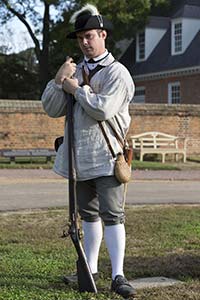Page content
James Monroe

Colonial Williamsburg interpreter Jay Belew as James Monroe
James Monroe came to Williamsburg to study but ended up joining the Revolution
- Born in 1754
- Joined the Patriot cause in Williamsburg
- Wounded at the Battle of Trenton in 1776
- Studied law under Thomas Jefferson
- Served as Virginia governor, U.S. senator and diplomat
- Was the fifth U.S. president, serving from 1817-1825
- Issued the Monroe Doctrine in 1823
- Died in 1831
Early Years
James Monroe was born in Westmoreland County in 1758 to tobacco planters Spence and Elizabeth Jones Monroe. An intelligent child, Monroe was first tutored at home by his well-educated mother and later attended a nearby academy.
Monroe was an exceptional student, particularly in Latin and mathematics, and when he graduated at 16, he enrolled at the College of William and Mary. In the same year—1774—both of his parents passed away. He inherited a portion of his parents’ plantation and at least one enslaved person.
Revolution
Monroe was soon caught up in the political fervor that gripped the college. He quickly formed a close friendship with an older student, James Innes, a leader of the student patriots. By 1775, Monroe was enlisted in Innes’ militia company and spending more time drilling than studying.
In June of 1776, after Lord Dunmore, Virginia’s last royal governor, fled Williamsburg, Monroe took part in a raid on the arsenal of the Governor’s Palace, helping to seize 230 guns and 300 swords for the militia. Promoted to an officer of the Third Virginia Regiment, he was wounded in December 1776 at the Battle of Trenton. He served as a staff officer in the Continental Army until 1779, when he resigned his commission.
He returned to Williamsburg and was appointed lieutenant colonel of Virginia forces, receiving temporary command of state troops after the British invaded Richmond in 1780. Monroe was unable to raise a unit of his own for permanent command, however, and soon sold a portion of his family property to pay his expenses.
At Thomas Jefferson’s suggestion and under his tutelage, he began reading law. He may even have attended some of George Wythe’s lectures as the first professor of law in country. The Revolution interrupted his education once more in 1781, when Monroe volunteered to assist the Marquis de Lafayette in what proved to be the pivotal campaign that culminated in the Battle of Yorktown and a major British defeat.
Early Political Career
In 1782, he was elected to the Virginia House of Delegates, and in 1783, to the Confederation Congress, effectively concluding his legal studies. Once again, Monroe sold a portion of his inheritance to cover his expenses.
While in New York, he met Elizabeth Kortright, a wealthy merchant’s daughter. They married in 1786, when he was 27 and she was 17. Two daughters survived infancy, Eliza and Hester. Due to Elizabeth Monroe’s fragile health, Eliza often filled her role as first lady when Monroe served as president.
Resigning from Congress that year, Monroe and his new bride moved to Fredericksburg. Monroe passed the bar exam and established his legal practice. His passion for politics, however, continued unabated.
After losing his bid for a seat in the first U.S. Congress to James Madison in 1778, Monroe accepted a series of appointments and elected offices: U.S. senator (1790), minister to France (1794), governor of Virginia (1799), He took diplomatic posts in France and Great Britain, and he helped to negotiate the Louisiana Purchase in 1803. He resigned a second stint as Virginia governor in 1811 to serve as James Madison’s secretary of state and secretary of war.
5th President
Monroe won the presidency as a Democratic Republican in 1816, the last of the "Virginia dynasty"—four of the nation’s first five presidents hailed from Virginia. The collapse of the Federalist party allowed him to win a second term virtually unopposed.
His presidency is often remembered for the Monroe Doctrine, which declared the Americas off-limits to European powers and eventually became a cornerstone of American foreign policy. In an address to Congress, Monroe declared that “American continents, by the free and independent condition which they have assumed and maintain, are henceforth not to be considered as subjects for future colonization by any European powers.”
Retirement
In 1825 Monroe returned to his plantations in western Virginia and was involved in the founding of the University of Virginia. While governor, the lifelong slave owner had responded harshly to an attempted slave uprising known as Gabriel’s rebellion. But Monroe, like his mentor Jefferson, eventually described slavery as a national “blight.”
Opposed to abolition, Monroe actively supported the American Colonization Society, and in 1822 allocated $100,000 in federal grant money to the ACS to sponsor freed slaves’ emigration to Liberia on the West African Coast. When Liberian settlers formalized the Republic of Liberia in 1847, they named their capital city Monrovia in recognition of the President’s efforts. After his wife’s death in the fall of 1830, Monroe moved to New York to live with his daughter Hester, who had married a New York cousin. Monroe died on July 4, 1831, exactly five years after the deaths of fellow Presidents Thomas Jefferson and John Adams.
